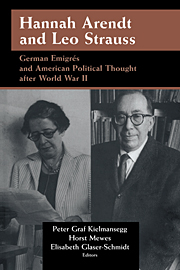Book contents
- Frontmatter
- Introduction
- PART I HANNAH ARENDT
- 1 Hannah Arendt and the Theory of Democracy: A Critical Reconstruction
- 2 The Questionable Influence of Arendt (and Strauss)
- 3 Hannah Arendt: A German-American Jewess Views the United States - and Looks Back to Germany
- PART II LEO STRAUSS
- PART III ROUNDTABLE DISCUSSION
- Select Bibliography of Works by Arendt and by Strauss on Modern Political Science and Philosophy
- Index
2 - The Questionable Influence of Arendt (and Strauss)
Published online by Cambridge University Press: 05 January 2013
- Frontmatter
- Introduction
- PART I HANNAH ARENDT
- 1 Hannah Arendt and the Theory of Democracy: A Critical Reconstruction
- 2 The Questionable Influence of Arendt (and Strauss)
- 3 Hannah Arendt: A German-American Jewess Views the United States - and Looks Back to Germany
- PART II LEO STRAUSS
- PART III ROUNDTABLE DISCUSSION
- Select Bibliography of Works by Arendt and by Strauss on Modern Political Science and Philosophy
- Index
Summary
The influence of Hannah Arendt and Leo Strauss on political theory in the United States has been considerable. I have no wish to deny that the great power of their work earned them their standing. Still, their influence is, to some nontrivial extent, worrisome. The nub of the matter is that both radiate disapproval of modern democracy. In a very selective way, I would like to take up the bearing of Arendt's work on modern democracy, and to a lesser degree, that of Strauss's on the same. My hope is to suggest that anyone committed to modern democracy should resist the influence of both these German-American philosophers while not being totally impervious to it. I therefore aim to question the unquestionable influence of Arendt and Strauss.
Now, it would be instructive to consider Herbert Marcuse alongside Arendt and Strauss. He was, for a time, even more prominent than they were. One can say that, in any case, Marcuse, Arendt, and Strauss were probably the three most influential émigré German political theorists in the United States. Marcuse provides yet another kind of hostility or skepticism toward modern democracy, to go with that of Arendt and Strauss. Their interrelationships can be a fascinating subject for reflection, all the more so because their common bond was Heidegger. Of the three, whose work will live on? Whose work will live the longest? No one can say. At the least, their reputations will have ups and downs.
- Type
- Chapter
- Information
- Hannah Arendt and Leo StraussGerman Émigrés and American Political Thought after World War II, pp. 29 - 44Publisher: Cambridge University PressPrint publication year: 1995
- 1
- Cited by



